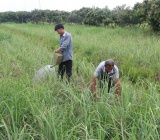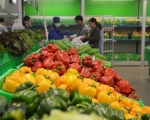Don't let dragon fruit exports to the EU go to waste
General Secretary of the Vietnam Fruit and Vegetable Association, Mr Dang Phuc Nguyen, analyzed many aspects of the reality that the dragon fruit examination was kept at 20% by the EU.
Costs increase by 4 to 5 times
The European Commission (EC) announced on June 13 that they will maintain the frequency of dragon fruit and instant noodles export inspection at 20%. Certain types of spices, okra, and chilli are kept at 50%, as announced at the end of December 2021.
General Secretary of the Vietnam Fruit and Vegetable Association, said that exporters and producers are greatly affected by this decision.
Taking the fresh dragon fruit exports to the EU as an example, Mr Nguyen said that the time for sampling and inspection at a frequency of 20% is approximately 4 days. This directly affects the consumption and competitiveness of dragon fruit products in Europe.
"If dragon fruits are exported by sea, businesses can find it difficult to ensure the quality of dragon fruit. Shipping to Europe took 20 to 25 days in the past. But since the outbreak of the Covid-19 pandemic, there has been a shortage of empty containers, increasing the shipping time to 35-40 days. While the maximum preservation time for dragon fruit, from the time of harvest, is approximately 6 weeks, equivalent to 40 days", Mr Nguyen said.
Consequently, the General Secretary concluded that businesses exporting dragon fruits to the EU have mainly utilized airlines since the beginning of 2022.
Mr Nguyen calculated that a container carrying 6 to 7 tons of dragon fruit, travelling by sea to Europe will cost approximately 20,000 USD. On average, the freight rate for 1 kg of fresh dragon fruit is 2 to 3 USD. However, the air freight rate has now increased to 10 USD/kg; 4 to 5 times higher.
The Free Trade Agreement between Vietnam and the EU (EVFTA) has officially entered into effect on August 1, 2021. Many tariff lines, including those for agricultural products, are set to 0%. However, the tax incentives are not enough for businesses to offset the increasing costs according to Mr Nguyen.
The danger of being abandoned
Discussing in-depth the 20% dragon fruit inspection frequency that the EU has set for Vietnam, Mr Dang Phuc Nguyen said that the EU will take random samples in each export shipment. Usually, the EU will calculate to sample the beginning, middle and end of each shipment.
All of the 20% samples collected will be put to the test by grinding, crushing, and then analyzing the residue components in the dragon fruit flesh. Notably, all of these samples have to be borne by the export business, and they are offset in the prices when sold in the EU market.
If a shipment, unfortunately, exceeds the EU's allowable residue threshold, businesses will also have to bear an additional "returning" cost - that is, transporting the entire shipment of goods back to Vietnam. After the shipping time, the products will almost be impossible to find consumption because they are past the expiration date.
"Under the 20% inspection requirement, businesses that export 10 kg of dragon fruit to the EU are considered to have 'lost' 2 kg. The quality of Vietnamese dragon fruit is among the highest in the world, but now it is in danger of being abandoned, it's very wasteful", Mr Nguyen pondered.
After working with the EU, Mr Nguyen further revealed that if businesses repeat residue problems, they may be subject to a higher frequency of testing, or even be banned from exporting to the EU.
The Vietnam Fruit and Vegetable Association has coordinated with the Ministry of Agriculture and Rural Development and related units to promote and raise awareness for exporters, purchasing units, cooperatives and farmers directly involved in exporting dragon fruits. In early January 2022, the Ministry of Agriculture and Rural Development held an online forum to connect dragon fruit production and consumption. In a notice sent by the EC on June 13, they commented: "The frequency of shipments being warned has not seen much improvement".
"Building a brand for a value chain of a product industry in a fastidious market such as the EU is very challenging. In addition to the cost issues as a result of the 20% inspection frequency, our reputation can also be affected on a global market scale, if businesses are not careful", said Mr Nguyen.
Looking for a solution
The impacts of dragon fruit exports being kept at 20% inspection frequency are internalized. However, Mr Dang Phuc Nguyen said that the current situation constantly puts stakeholders in a position to make difficult decisions.
For exporters, due to logistics challenges, they have to place an order with the carrier 3 to 4 days in advance, even a week in some cases and pay the freight in advance. This leads to the mindset of "finding more goods", avoiding damage from only exporting 2 tons for a 3-ton order.
Buyers (traders), also face similar pressure. The risk of being fined under the contract committed with exporting businesses is always looming over their heads.
Producers are also at risk of being affected by fertilizers and pesticides spread by water, wind, or by leaking into the soil from adjacent fields.
"It is a fact that when troubles occur, it is difficult to determine the party responsible because anyone can make errors in the value chain", Mr Nguyen stated.
Some businesses that export to the US, the EU and Japan can still operate, according to Mr Nguyen, because they have their own raw material areas, and they have standardized all stages of production, farming, preliminary processing, storage, packaging and exporting. Procedures related to certification or GlobalGAP standards are strictly controlled.
However, the number of this type of business is low, according to Mr Nguyen.
To solve the problem of dragon fruit as well as agricultural product exports to difficult markets, the General Secretary of the Vietnam Fruit and Vegetable Association advises exporters to proactively control quality at home.
"When a business is entirely sure of a shipment, export it. We should accept the freight rate from the carrier, instead of taking goods of unknown origin, and then rely on our luck to avoid inspection in importing markets", Mr Nguyen expressed.
On the other hand, businesses need to organize inspection and testing of goods sources before exporting. Mr Dang Phuc Nguyen suggested, that in addition to inspecting the quality of fruit after harvesting from the tree, businesses can inspect another time at the warehouse, before packaging and delivering to the producer.
Additionally, exporting businesses must coordinate with state management agencies, cooperatives, and people during the growing season to periodically inspect the fields on a weekly and monthly basis to monitor the quality of agricultural products in a timely manner.
For farmers who directly produce, Mr Nguyen recommends raising awareness and having commercial contracts with strict binding terms. "If possible, farmers need to be informed to know where their goods will be exported and consumed", emphasized Mr. Nguyen.



669740786643.jpg&w=160&h=140)


669740786643.jpg&w=150&h=120)

